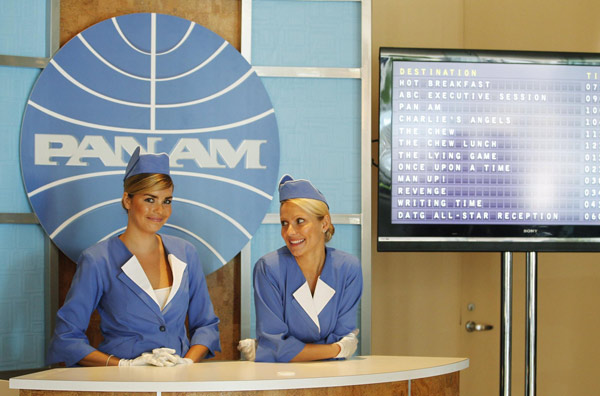

 |
|
A booth set up to resemble a Pan American World Airlines (Pan Am) ticket counter promotes the new television series "Pan Am" at the ABC Summer TCA Press Tour in Beverly Hills , California August 7, 2011.[Photo/Agencies] |
The actor and comedian was joking recently about the upcoming drama series "The Playboy Club". But McHale could just as easily have been referring to much of the new fall season on U.S. television, as writers revisit the Swinging Sixties (and even the Seventies) in search of 21st century hits.
Call it nostalgia, a chance to showcase sex, or the spell cast by multiple Emmy-winning drama "Mad Men", but period shows and reboots of classic series are making a comeback on TV.
"Pan-Am" on ABC is set in the early 1960s at a time when jet travel was glamorous rather than groan-inducing; "The Playboy Club" on NBC features 1960s Bunnies in Chicago; "Charlie's Angels" storm back to ABC from the 1970s in a modern remake; and if drab post-war London is your cup of tea, you will find it in 1950s thriller "The Hour" on BBC America.
Writer and producers deny they are in the copycat business, despite widespread admiration in Hollywood for the stylish but slow burning "Mad Men" on AMC.
But the critical success of the 1960s advertising drama -- despite its tiny audience of less than four million viewers -- has inspired others to mine a period ripe with social change.
"There was an enormous amount of American exceptionalism and hope and desire, and dreams that we were going to go to the moon. And yet the kettle was absolutely coming to a boil," said Thomas Schlamme, one of the creators of "Pan-Am".
Christina Ricci, who plays one of the young flight attendants on the show, agreed. "There's that sense of excitement and freedom that goes with this sense of travel and everything being new."
Ironically, what was seen entertainment wise on American television in the 1960s rarely captured the social, sexual, women's and civil rights revolutions of the era, said Robert Thompson, pop culture professor at Syracuse University.
"1960s television was all about talking horses, monsters in the suburbs, flying nuns, witches and genies. It is as though the exciting '60s happened, but the entertainment television made at the time totally ignored all those things.
"What 'Pan-Am' and 'The Playboy Club' can do is show an era in a TV series in a way that the actual era could never have done because of tighter standards and content rules at that time," Thompson said.
SEXY OR SEXIST?
But some of the behavior and attitudes considered standard in the early 1960s are seen differently through modern eyes.
"The Playboy Club" (and to a lesser extent "Pan-Am") are already under attack for portraying women as sex objects.
Some critics have suggested that both shows are going after big audiences simply by showing pretty young women in Playboy Bunny and stewardess costumes that are regarded as sexy.
The shows' backers reject the accusations. "Playboy Club" executive producer Chad Hodge described his show as "all about empowering, and who these women (Bunnies) can be, and how they can use their position to get it."
Schlamme of "Pan-Am" said the various ways women were treated by men in the early 1960s provided a great source of drama with multiple storylines.
Different problems faced the updated "Charlie's Angels" and a 2011 remake of the British police drama "Prime Suspect" that originally starred Helen Mirren in the early 1990s.
NBC's "Prime Suspect" is playing down the overt sexism among police toward women officers-in-charge that marked the original series.
Creator Alexandra Cunningham said the new version with Maria Bello would be more humorous and would "try to make it more realistic, because sexism isn't gone. It's kind of more subtle and insidious in a modern world."
The "Charlie's Angels" remake will bring the glamorous trio of female crime fighters closer to solid ground than their 1970s counterparts by focusing on character, producers said.
TV executives say comparisons to "Mad Men" begin and end with the period setting of many of the new offerings. But as Americans struggle to emerge from recession, nostalgia is clearly back in fashion.
"The early 60s were a very hopeful time, with all kinds of things beginning, and that's what ('The Playboy Club') is about," said executive producer Ian Biederman. "And that's why people are attracted to it right now -- to take a little break from the way things are today"